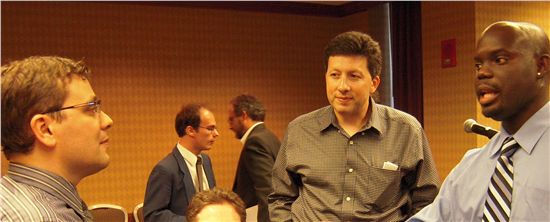Purpose
- Investigates causes tending to destroy or impair the free-market system.
Summary
Through its scholarly journal, Critical Review, the Critical Review Foundation has pioneered a new approach to understanding modern politics, in which ignorance is treated as the default position of voters, political activists, media personnel, and policy makers; and unintentional bias in politics and policy is hypothesized to be a common result. A cohort of seven young scholars who have been influenced by this approach engaged in six hours of public dialogue with ten eminent scholars from political science and other fields at a Conference on Political Ignorance and Dogmatism, held in Boston on August 31, 2008, with the assistance of the Walker Foundation. The comments of Scott Althaus, author of Collective Preferences in Democratic Politics (Cambridge University Press), were representative: “What a wonderful experience! It was among the very best scholarly interchanges that I’ve ever attended….All in all, I consider this to have been a smashing success.”

Conference participants Ilya Somin, Dan Greenberg, and Brian Pitt.
Description
The conference was a series of five one-hour dialogues among prominent political scientists and young scholars who are doing research on political ignorance and ideology. No papers were presented; instead, each panel was a roundtable in which the participants discussed the broader implications of research on: the nature of political ignorance; the connection between ignorance and policy error; the political consequences of the participants' ignorance; dogmatism and ideology as coping devices in the face of ignorance; and the normative ramifications of this research. The dialogical format evidently provoked new thinking on the part of the participants and the audience.
Purpose
An accumulation of empirical research in political science supports the conclusion that the general public's ignorance, and political elites' dogmatism, combine to favor the adoption of simplistic public policies that cause more problems than they solve. In short, many problems are caused or exacerbated by the simplicity of our political thinking, when compared to the complexity of the societies that modern states try to regulate.
This conclusion has been explored in recent years in Critical Review. At the conference, young scholars who have been influenced by Critical Review tested their ideas in open-ended conversation with eminent scholars of public opinion and political psychology.
Scope
The ideas discussed at the conference may explain the tendency of American voters and political decision makers (and those in other countries) to be hostile to free-market ideas. Most people are ignorant of the economics that stands behind such ideas; and in any case, economic ideas tend to be counterintuitive, and to run counter to most people's ideological training.
Information Dissemination
Video of the conference will be posted at www.criticalreview.com, and a transcript is appearing in volume 20, no. 4 of Critical Review.
Amount Approved$16,522.00
on 5/29/2008
(Check sent: 9/16/2008)